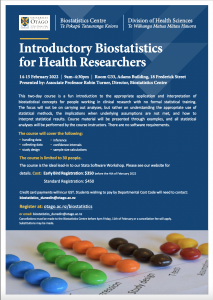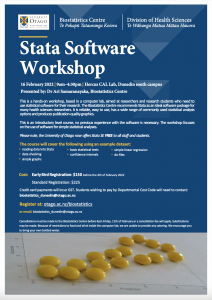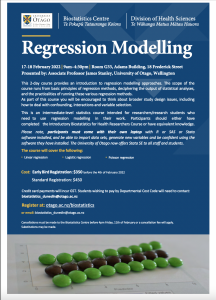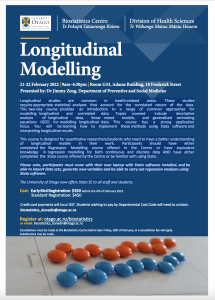Upcoming events hosted by or involving Genetics Otago will be listed here. Please check back regularly for updates. A calendar of events that may be of interest to our members can be found at the bottom of this page and in the sidebar of other pages on this site, please note that this includes events hosted outside of Genetics Otago.
GO Annual Symposium – New Date Confirmed!
As usual, the Symposium will highlight the fantastic research being done by GO members from around the country through presentations, posters and awards. We are aware that this date clashes with a couple of other conferences happening in NZ and we apologise if this means you are unable to attend.
Date: Thursday, 20th February 2025
Time: 9:00 am – 5:00 pm
Venue: TBC
Programme
A draft programme will be available here soon.
Registration
Registration for this event is now open via the button below. If you had already registered for the event scheduled for December we ask you to please register again so that we have accurate numbers for catering. If you made a payment at that time, this should have been refunded to you – please contact us if you don’t think this has been processed.
Registration will remain open until Monday the 3rd of February, however we hope that by opening now, prior to end of year budget cut-offs, you maybe able to charge the registration fee to any surplus in your 2024 University accounts.
Registration Fee
Due to budget constraints, we will be charging a $50 per person registration fee for all attendees to subsidise the costs associated with the Symposium. We have received confirmation that this registration fee can be paid from S accounts, and if you are in a position to make a donation on top of this fee, we would gladly receive it. However, we do not want the payment to be a barrier to attendance, so if you are not in a position to make a payment, please contact us go@otago.ac.nz.
Payment Methods
Payments from an S account (or other University account) can be journaled to Genetics Otago account GL.10.LH.A14.2541 via your finance associate. Please include the surname(s) of the registrants that the payment covers in the narration.
If you need to make payment using funds from outside the University this can be arranged via the Cashier’s Office. Please contact us for details (go@otago.ac.nz).
Awards
The Annual Genetics Otago Awards including The Genetics Otago Award, Outstanding Mentor Awards, Student Supervisor Award, Publication Awards, Poster Awards and Science Communication Prize will be presented at the conclusion of the Symposium and nominations for these are now open.
All award nominations should be submitted by email to go@otago.ac.nz.
Please note: Award nominations are now open until Monday 3rd February at 5pm.
Full details of the awards can be found here: Award Details.
Calendar of Events
The below is a calendar of events hosted by GO as well as events hosted by others that may be of interest to our members. If you have an event you would like us to include please contact us here.
Dr Chi Lynch-Sutherland who will present her exit seminar entitled ‘Repeating the past: do cancers use early developmental repeat elements to drive malignancy?’.
Please see attached for more information.
The University of Otago Division of Health Sciences Early and Mid-Career Researcher (EMCR) management committee is holding a one-day conference on 11 November 2021.
The theme of the conference is collaboration, where we will invite EMCRs within the Division to present where you see your research going, and what collaboration you might be seeking.
Professor David Murdoch (Vice-Chancellor Designate, University of Otago), Professor Gary Evans (MBIE Chief Science Advisor) and Dr Sarah Diermeier (founder of Amaroq) are confirmed keynote speakers. They will present on strengthening collaborations between academic institutions and government agencies and creating a start-up company from your research.
The EMCR management committee warmly invites you to attend the Conference.
We look forward to seeing you soon!
athology Department Seminar Series for 2022 begins this Friday 4th February. Our speaker will be Prof. Greg Anderson from the Centre for Neuroendocrinology & Department of Anatomy (University of Otago) who will present a seminar entitled “A neuronal circuit for stress-induced infertility”.
The seminar will be held at the usual time of 1pm in the D’Ath Lecture theatre and accessible over zoom due to the Red Light settings (please contact the organiser for the link). For those attending in person, there will be refreshments provided at 12.45pm (~15min before the seminar). Details of which will be provided closer to the time.
Our Pathology Department Seminar Series for 2022 continues as a Research Forum this Friday 11th February. The Forum will be hosted by Dr. Karen Reader- Operations Manager, Otago Micro and Nanoscale Imaging (OMNI). Karen will be presenting on “Tools for your Research–An introduction to the Flow Cytometry, Histology, Confocal and Electron Microscope units”.
The forum will be held at the usual seminar time of 1 pm in the D’Ath Lecture theatre and accessible over zoom due to the Red Light settings, contact organisers for link.
For those attending in person, there will be refreshments provided at 12.45pm (~15 min before the seminar). Food will kept for collection in the foyer near the back entrance of the D’Ath lecture theatre. We have a capacity for 50 people in the D’Ath.
This two-day course is a fun introduction to the appropriate application and interpretation of biostatistical concepts for people working in clinical research with no formal statistical training. The focus will not be on carrying out analyses, but rather on understanding the appropriate use of statistical methods, the implications when underlying assumptions are not met, and how to interpret statistical results. Course material will be presented through examples, and all statistical analyses will be performed by the course instructors. There are no software requirements.
This is a hands-on workshop, based in a computer lab, aimed at researchers and research students who need to use statistical software for their research. The Biostatistics Centre recommends Stata as an ideal software package for many health sciences researchers. It is reliable, easy to use, has a wide range of commonly used statistical analysis options and produces publication-quality graphics.
This is an introductory level course, no previous experience with the software is necessary. The workshop focuses on the use of software for simple statistical analyses.
Please note, the University of Otago now offers Stata SE FREE to all staff and students.
This 2-day course provides an introduction to regression modelling approaches. The scope of the course runs from basic principles of regression methods, deciphering the output of statistical analyses, and the practicalities of running these various regression methods.
As part of this course you will be encouraged to think about broader study design issues, including how to deal with confounding, interactions and variable selection.
This is an intermediate-level statistics course intended for researchers/research students who need to use regression modelling in their work. Participants should either have completed the Introductory Biostatistics for Health Researchers Course or have equivalent knowledge.
Please note, participants must come with their own laptop with R or SAS or Stata software installed, and be able to import data sets, generate new variables and be confident using the software they have installed. The University of Otago now offers Stata SE to all staff and students.
Prof. Alex McLellan from the Department of Microbiology and Immunology (University of Otago) will present a seminar entitled “Genetically engineered lymphocytes for the treatment of solid cancers” at our Pathology Department Seminar Series on Friday 18th February 2022. The seminar will be held at the usual time of 1pm in the D’Ath Lecture theatre and accessible over zoom due to the Red Light settings.
Please contact the organisers for Zoom details.
For those attending in person, there will be refreshments provided at 12.45pm (~15 min before the seminar). Small packed lunches will be available- some sandwiches, choice of chips, popcorn, oaty bars and choice of packed beverages. Food will be kept for collection in the foyer near the back entrance of the D’Ath lecture theatre 😊 . We have a capacity for 50 people in the D’Ath.
Longitudinal studies are common in health-related areas. These studies require appropriate statistical analyses that account for the correlated nature of the data. This two-day course provides an introduction to a range of common approaches for modelling longitudinal and correlated data. Topics covered include descriptive analysis of longitudinal data, linear mixed models, and generalised estimating equations (GEE) for modelling longitudinal data. This course has a strong application focus. You will be learning how to implement these methods using Stata software and interpreting longitudinal results.
This course is designed for quantitative researchers/students who need to have a better understanding of longitudinal models in their work. Participants should have either completed the Regression Modelling course offered in the Centre or have equivalent knowledge in regression modelling for both continuous and discrete data AND have either completed the Stata course offered by the Centre or be familiar with using Stata.
Please note, participants must come with their own laptop with Stata software installed, and be able to import data sets, generate new variables and be able to carry out regression analyses using Stata software.
The University of Otago now offers Stata SE to all staff and students.





